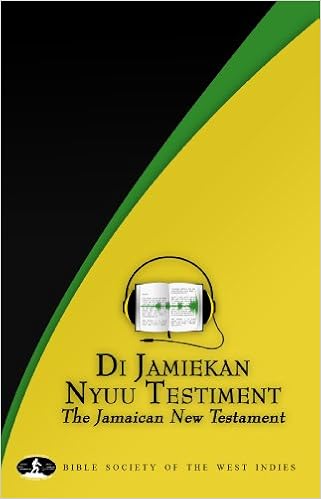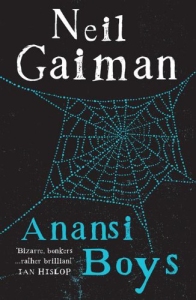An aspiring novelist from the Caribbean who grew up in England recently asked me about ‘appropriation of voice’. Her novel takes place in both these locations, places where people speak a variety of Englishes, or dialects of that larger dialect, English, for the word applies to a national, as well as regional or local language. She didn’t feel confident in accurately representing all these language varieties, since only some were native to her. It’s a concern that I appreciate, since, for one thing, it irritates me enormously when I come across writing purporting to represent Jamaica Talk and it no sound like no patwa me know.
So how to avoid insulting people by writing their languages inaccurately?
I pointed her to Neil Gaiman’s Anansi Boys, which is full of Jamaican language that doesn’t hardly stumble — well, maybe in one likl place, but is ongle one likl one dat me did find inna de whole entire book. So is how him manage dat and him no talk patwa, tall tall? (I could have written ‘t all ‘t all, a question of orthography that we’ll come back to.)
I took to the Internet to find out if there was a place where Neil Gaiman explained, but there wasn’t one that I could find. I don’t think it takes a genius to figure out, though, that he probably wrote down what he wished his Jamdown characters to say in the best Jamaican he could come up with, then sent it to a native speaker or two to fix anything that wasn’t authentic Jamaica Talk.
That’s one solution for an author creating characters who speak a language that he/she doesn’t speak fluently – or at all – and so doesn’t feel confident putting down on the page. Another, perhaps faster way would be for the author to invite one or more folks who are native speakers of any or all of the languages used in the text, ask him/them to listen as the text is read to them, and, in consultation with the native speakers, make any necessary adjustments.
A time intensive method that involves lots of invention but can work well, is to comb the Internet for posts, documents, articles and books (creative, linguistic, historical, etc.), an d using these resources, cobble together dialogue, narrative, or both, out of written speech as represented therein by native speakers, always being careful of copyright issues. In fact, if one is creating characters for a story in any language set in the past, this approach is pretty much the only one possible. So, for example, to discover eighteenth century spoken English, one might forage in Defoe and Fielding, while to ferret out nineteenth century English as spoken by folks of various classes, one might search Dickens and Thackeray. One might research monographs by linguists and historians as well, of course, but I would go first to the writers with the hope of getting inspired as well as informed.
d using these resources, cobble together dialogue, narrative, or both, out of written speech as represented therein by native speakers, always being careful of copyright issues. In fact, if one is creating characters for a story in any language set in the past, this approach is pretty much the only one possible. So, for example, to discover eighteenth century spoken English, one might forage in Defoe and Fielding, while to ferret out nineteenth century English as spoken by folks of various classes, one might search Dickens and Thackeray. One might research monographs by linguists and historians as well, of course, but I would go first to the writers with the hope of getting inspired as well as informed.
A further, and challenging problem that arises, regardless of whether the author is a native speaker or is working with ‘strange’ languages, is that of orthography. Representing the sound of a language is not so easy. The most accurate means, which would be to use a phonetic alphabet, is often not helpful, since only the initiated are able to understand these writing systems. Many people complain about Di Jamiekan Nyuu Testiment for that reason. Delighted at the idea of a Bible, or portion of it, in patwa, they are distressed to find that they can’t cipher it out!
I tackled that problem when writing my most recent collection of poetry, de book of Mary, published by Mawenzi House in November of last year. The book is entirely in Jamaican Creole, and is intended for audiences of creole speakers, as well as those who don’t speak patwa. Jamaican writer friends like Mervyn Morris, who has used patwa in his own work and also edited Louise Benne tt’s poetry, as well as Jean D’Costa, Olive Senior and Velma Pollard, were generous with advice, and I eventually arrived at a method that was workable. There’s a note on language in de book of Mary, but I’ll share more of the process by which I arrived at the method I used, and the rationale for my choices, in my next post.
tt’s poetry, as well as Jean D’Costa, Olive Senior and Velma Pollard, were generous with advice, and I eventually arrived at a method that was workable. There’s a note on language in de book of Mary, but I’ll share more of the process by which I arrived at the method I used, and the rationale for my choices, in my next post.
Whatever the means, it is worth taking the time to get down dialects, patwas, local and regional forms of speech in a respectful and reasonably accurate manner. In addition to which, meeting the challenge is inevitably instructive for the writer himself or herself…
